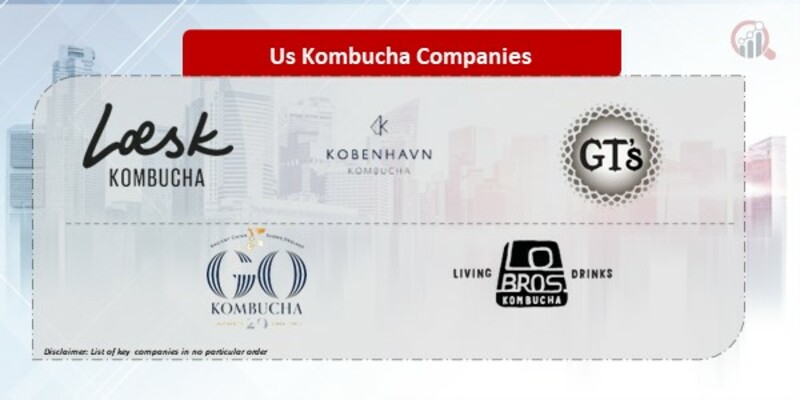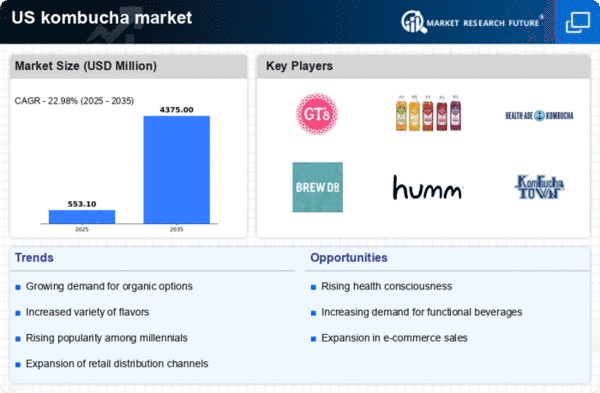Top Industry Leaders in the US Kombucha Market

Strategies Adopted by Us Kombucha Key Players
The kombucha market in the United States has been expanding rapidly, driven by a growing consumer preference for functional beverages and natural products. This effervescent, fermented tea has gained popularity for its purported health benefits, including gut health and immune support. The market is characterized by a diverse range of players, strategic movements, and evolving consumer trends.
List of Key Players
- GT’s Living Food
- København Kombucha
- Remedy Drinks
- GO Kombucha
- Læsk; Lo Bros.
- VIGO KOMBUCHA
- Brothers and Sisters
- BB Kombucha
- MOMO KOMBUCHA
- Real Kombucha
- Equinox Kombucha
Companies in the kombucha market have adopted various strategies to capture and maintain market share. These strategies include product line diversification, flavor innovation, partnerships with retailers, and expansion into new geographic regions. Emphasizing the health benefits of kombucha, such as probiotics for gut health, has been a key marketing strategy. Additionally, some brands have ventured into creating alcohol-infused kombucha, catering to the adult beverage market.
Factors for Market Share Analysis
Market share in the kombucha sector is influenced by several factors. Product quality, taste, brand reputation, pricing, distribution channels, and alignment with consumer health trends are crucial. Companies that effectively leverage these factors can gain a competitive edge. The authenticity of the kombucha brewing process and adherence to traditional methods can also play a significant role in a brand's market positioning.
New and Emerging Companies
The US kombucha market is seeing the entry of new and emerging brands, often focusing on unique selling propositions like locally sourced ingredients, innovative flavors, or specific health benefits. These companies are creating a niche for themselves and challenging established players with their innovative approaches and targeted marketing strategies.
Industry News and Current Company Updates
The industry has seen several recent developments. There has been a trend towards consolidation, with larger beverage companies acquiring successful kombucha brands to diversify their product portfolios. For example, PepsiCo's acquisition of KeVita, a leading kombucha brand, is a testament to the growing mainstream appeal of kombucha.
Investment Trends
Investment in the kombucha market has been robust, with venture capitalists and large beverage corporations showing interest. Investments are primarily directed towards expanding production capacity, marketing, and research and development to create new flavors and formulations. The market's strong growth potential continues to attract investors looking for opportunities in the health and wellness beverage sector.
Overall Competitive Scenario
The US kombucha market is highly competitive, with a mix of large, established companies and small, artisanal producers. The market is somewhat fragmented, given the presence of numerous regional brands. Competition is based on various factors, including flavor innovation, marketing tactics, distribution efficiency, and brand loyalty.
Recent Developments
The kombucha market witnessed significant developments. One of the key trends was the increased emphasis on low-sugar options, responding to consumer demand for healthier beverage choices. Brands have been reformulating their products to reduce sugar content while maintaining the desired taste and probiotic benefits.
Another development was the expansion of kombucha into new retail channels. Beyond health food stores and specialty retailers, kombucha is increasingly available in mainstream supermarkets, convenience stores, and even on tap in restaurants and cafes. This expansion has made kombucha more accessible to a broader consumer base.
Additionally, there was a growing focus on sustainability within the industry. More brands are adopting environmentally friendly practices, from sourcing organic ingredients to implementing sustainable packaging solutions. This shift not only aligns with consumer preferences but also helps companies reduce their environmental footprint.
In terms of regulatory landscape, there have been discussions around clearer labeling standards for kombucha, particularly concerning its alcohol content and probiotic claims. This comes as regulators and industry stakeholders aim to establish guidelines that ensure consumer safety and product integrity.











